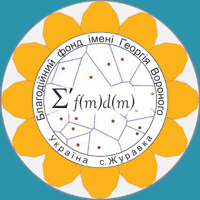|
* * * * * * * * * * *
Early death of Georgy Voronoi struck everybody who knew him. In the obituary
professor I.Braitsev wrote:
"Nobody could believe that Georgy Feodosiyovych, who was highly
respected
and loved by everybody, had died. Something extraordinary had happened ─
such was the general feeling. Everybody realized that they had prematurely lost
an outstanding scientist, renowned professor who had been a pride and an
adornment of two higher schools in Warsaw...
Seeing off the deceased's remains to the railway station for carrying them to
the place of burial in the village of Zhuravka, everybody was grieved the more
so because they had forever lost a truthful, sympathetic and warm-hearted
man...”
At the same time I.Braitsev expressed his deep regret that Voronoi succeeded
to set forth on paper only a very small part of the immense work from the
theory of indefinite quadratic forms.
"Hardly can we hope to recreate from them at least in part those
sophisticated trains of geometrical thought was mentioned in the diary algorithm,
of which the
deceased always spoke with great inspiration and enthusiasm. For having
it done it is not enough to know in general outline those directions which the deceased
followed, it is necessary to be such a brilliant expert in the theory of quadratic
forms with n-variables as he was, it is necessary to wield the marvelous
technique which the deceased mastered at the end of his life, and it is also
necessary to be so staunchly devoted to this branch of mathematics as he was.”
* * * * * * * * * * *
Georgy Voronoi's body, according to his last will, was transported to Zhuravka,
to his native land. G.Voronoi was embalmed and lay in a specially built crypt.
Later on, in 1910, Feodosii Voronyi, his father was buried in this crypt.
In 1932, at the period of struggle against well-to-do peasants [so-called
"kulaky"] in the Soviet Union, this crypt was destroyed. The peasants
reburied the remains of Georgy Voronoi and his father nearby in the common
grave.
Old people in Zhuravka recall some episodes of these sad events. They
remember that the trees of a luxuriant garden which was grown by Feodosii
Voronyi were cut. " There were
apple trees of many kinds, no more such trees grew in Zhuravka after. ─ one old
resident relates, ─ They were blossoming
so fragrantly, that one
could have a headache. Voronyis were very diligent people. G.Voronoi's wife
was a small woman and very quick. One could always see her hurry along a
village street ─ to give medical care to the people.[Olha Mytrophanivna was a
midwife. When being in Zhuravka she treated peasants free of charge. Her
brother, Borys Mytrophanovich Krytsky, was a well-known physician in Pryluky
region].
On Christmas eve they put up a large Christmas tree for all the children in
Zhuravka"...
The family had to leave the village at night ─ it was dangerous to
remain there. They did not return to their native place anymore...
The further destiny of the family was rather grievous in the years of
the communist great terror.
Georgy Voronoi had six children. One of his daughters died in childhood.
The eldest daughter, Oleksandra, was educated at the Women's courses of
higher level, then she taught at the special institute for advanced studies of
Ukrainian leaders. [so-called "ФОН"
(in Russian ─ faculty of a special purpose)]. She also published articles on Ukrainian literature. Her
husband, Kostantyn Polubotko, was a research worker. In 1937 he was arrested
and exiled to the North, to Ohotske sea and had to work as a fisherman. He died
there in three years. Oleksandra died in an invalid house.
The eldest son, Oleksander, was a physician. He believed that an electrical
current in a human body, operated by the definite manner, could ruin cancer
cells. He succeeded to cure some kinds of tumours (mainly in the stomach). In
1938 he was arrested and did not return from a hard labour camp.
The youngest son, Yuri, was a surgeon. He is the first person in the
world who accomplished transplantation of a human organ (1933). The
transplanted kidney was functioning for two days. He could not continue his work
in an oppressive political atmosphere which prevailed in the country.
The younger daughter, Maria, was a school teacher. Her husband, Vasyl Vasylenko, was a
veterinary surgeon. In 1937 he was proposed by secret police to become an
informer and inform on his colleagues. He rejected the proposal and was
sentenced to death. Later on Maria was arrested too and sentenced to ten years of the camp of special regime in the Far East.
The youngest daughter, Olena, became a dentist.
Georgy Voronoi's children saved the papers, note-books of the mathematical
diary, and other documents belonged to G.Voronoi and gave everything to the
National Library of Ukraine, to its Institute
of Manuscripts where they
are kept now.
In 1952-1953, the Complete Works of G.Voronoi (in three volumes) were
published by the Institute of Mathematics of Ukraine.
Published in: Voronoi's Impact on
Modern Science, ─ Inst. of Mathematics Nat. Acad. Sci. Ukraine, Kyiv, 1998..
| 


